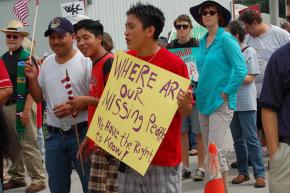Solidarity for victims of the Postville raid
By
POSTVILLE, Iowa—More than 1,000 people turned out July 27 to rally in defense of immigrant rights. The rally was a response to a May raid at the AgriProcessors meatpacking plant, the largest kosher plant in the U.S., in which nearly 400 people, almost all of them Guatemalan immigrants, were arrested by Immigration and Customs Enforcement in the largest single workplace raid in U.S. history.
People of all ages and races attended from across the Midwest, including a sizable number of Latino families and students, as well as residents of Postville and the surrounding communities.
Rally organizers included Chicago’s Jewish Council on Urban Affairs, Jewish Community Action of Minneapolis, the Coalition for Worker Justice of Madison, Wis., St. Bridget's Catholic Church of Postville and members of the Luther College community from Decorah, Iowa.
Chants of “No more raids,” “Sí se puede” and “Keep families together” rang out as the crowd traveled the mile-long route through town, stopping at the gates of the AgriProcessors plant. Organizers of the rally called for an end to raids and a path to citizenship for undocumented immigrants.

"People have come here from Minneapolis, Wisconsin, Chicago, New York and New Jersey…because we care," said Rabbi Harold Kravitz of the Adath Jeshurun Congregation in Minnetonka, Minn., as the crowd paused near the AgriProcessors site. Kravitz said that protesters wanted to end immigration policies punishing those who come to the U.S. to make a living.
Since the raid, nearly 300 of those arrested have been convicted of document fraud and other similar charges. Many of those arrested waived their rights in hopes of quick deportation, but as the New York Times noted, “[I]n a twist of Dickensian cruelty, more than 260 were charged as serious criminals for using false Social Security numbers or residency papers, and most were sentenced to five months in prison.”
According to Erik Camayd-Freixas, a professor and Spanish-language interpreter who provided translation services for some of those arrested, many of the workers didn’t understand the charges against them, nor the court proceedings.
Since the raid, abuses of AgriProcessors’ workforce—already well-documented by groups, including Human Rights Watch and the Jewish Daily Forward—have attracted more attention from the mainstream media.
According to the Times, there is mounting evidence that AgriProcesors illegally employed children, some as young as 13, in dangerous conditions, sometimes for shifts as long as 17 hours and without consistent overtime pay. Other allegations include physical abuse of workers by plant management.
Despite a small anti-immigrant counterprotest on the day of the rally, many Postville residents offered support to the immigrant workers. The St. Bridget’s parish, for example, offered sanctuary and services for hundreds of families following the raid, and many residents say the loss of so many families has been a terrible blow to the community.
Cindy Moser, a resident of the nearby town of Elkader, told the Associated Press that she watched her two grandchildren so her daughter and son-in-law could take part in the march. "If they want to come and work here, I say fine," Moser said. "We all saw the effect of this [raid]. My grandson, he told me, 'Grandma, they took my friends away.' I hope this stops."


